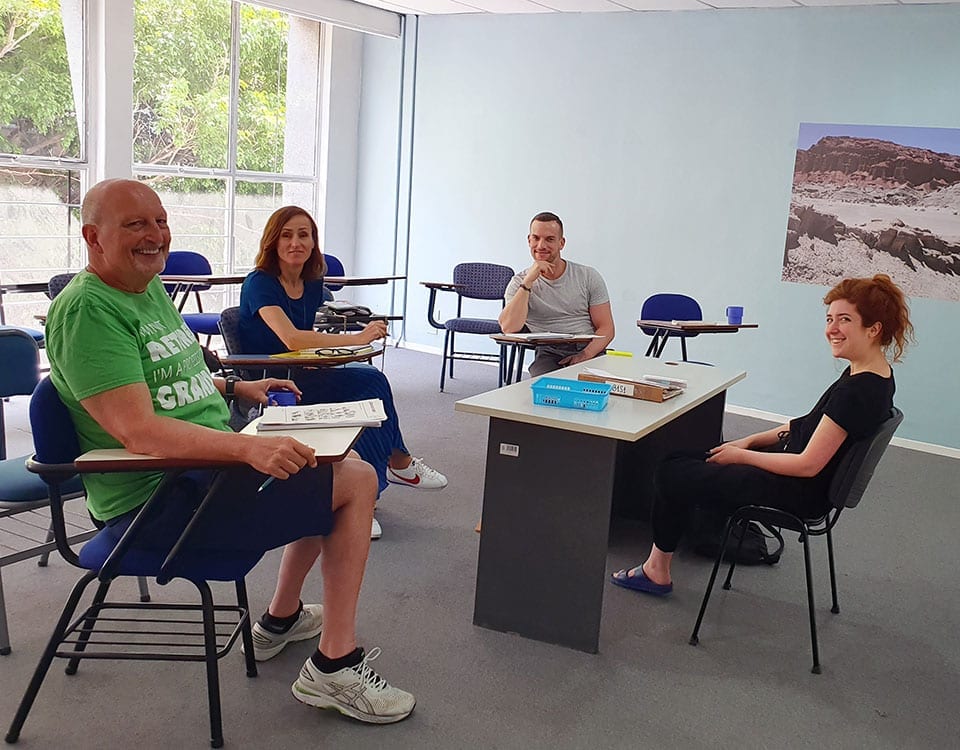Learning Spanish as a foreign language is a bit like building a house. You need to lay a good foundation, add the other necessary structural elements, and then embellish it with the details. However, when you are finished constructing the house, that doesn’t mean you can just leave all of your hard work alone and expect it to last forever. Like a house, language abilities require constant upkeep, and achieving fluency is not something that you reach and then attain it forever, but more of a continuous process that requires practice and maintenance. In addition to formal online Spanish classes (like ours at Vamos Spanish Academy), here are some tips to keep your Spanish skills in tip-top shape:
► Practice with Native Speakers
This, of course, is one of the most important things you can do to practice and maintain a language. If you’re in a Spanish-speaking city like Buenos Aires, your conversation partners can be found on every corner. However, it might be a little easier if you go to a place where people are specifically looking to practice speaking skills; in Buenos Aires, there are a slew of conversation clubs to attend to meet locals who you can practice with, some of the more popular ones include Mundo Lingo and Mate Club Conversation, and they have multiple locations all over the city. These meetings are a great way to learn Spanish in Buenos Aires because the people you chat with are also looking to practice English, so the environment is very relaxed, welcoming, and low-pressure. If you’re not in a Spanish speaking place at the moment, try to find meet-ups online, or websites where you can find conversation partners.

Explore your Options!
Although practicing with native speakers is the absolute best way to fully immerse yourself in the language, there are many other tools that you can use to immerse yourself, even if you do not have the opportunity to travel to a Spanish Speaking country. Below I have outlined some of the things you can do to maintain, and improve your Spanish without having to move abroad (although it is definitely worth it)!
► Reading
Reading is something that we normally like to do for fun. However, even if you like to read, it can sometimes be difficult to sit down and read something that you know is going to take a lot of effort to get through, which is often the case when reading in a second language. A great goal to set is to read one piece of reading material in Spanish per day. They can — and should — be short; whether it be a page of a novel, a brief news article, or a poem if you are really up for a challenge. Just like building a house, you will never finish your Spanish learning journey. You may be fluent, and you may have closely perfected the language, but if it is not your first language, there will always be more to learn. Reading in Spanish will offer you the opportunity to gain new vocabulary everyday. It is important to take note of these new words and put them into practice, because if you do not, you will never remember them. A challenge that many learners have is that once they reach an advanced level, it is hard for them to keep advancing, they hit a plateau because they have already mastered all of the standard grammar concepts. On the other hand, reading will constantly provide you with new vocabulary. If you think about it, even when you read in your native language, it is not uncommon to learn a new word here and there!
► Watching Movies
Like reading, watching movies is another great way to learn and maintain a language, whether you are living in a Spanish-speaking country or have gone back home. Not only is it a great way to maintain your ear for the language and learn new words; it is also enjoyable! You can watch movies from various different countries to familiarize yourself with different accents as well as familiarize yourself with different cultures at the same time! Subtitles (in Spanish of course!) are a great way to make sure you catch everything, nonetheless, you should try out your listening comprehension skills once in a while and see if you can do without them!
► Keeping a Journal
Keeping a journal is a very useful and efficient way to keep track of your learning. Numerous studies have shown that writing down what you hear or see, whether it be a vocabulary word, a phrase, or grammatical revelation is the best way to mentally reinforce what you have learned. Having a small notebook with you to quickly jot down useful phrases and new vocabulary words is extremely useful. Write down unfamiliar words and expressions you come across when you’re out walking, talking with native speakers, watching movies, etc. Not to mention that it is very useful way to ingrain these newfound concepts in your brain, it is more than convenient to have it all in one place for quick reference.
As you can see, learning Spanish online or offline is a lot like building a house. It is somewhat of a hobby. It takes hard work, upkeep, and patience, but the outcome is more than rewarding. If you give it your best effort, and a little bit of love, it will turn out better than you could have ever hoped for. Have fun, make it your own, and add one more skill to your résumé!






